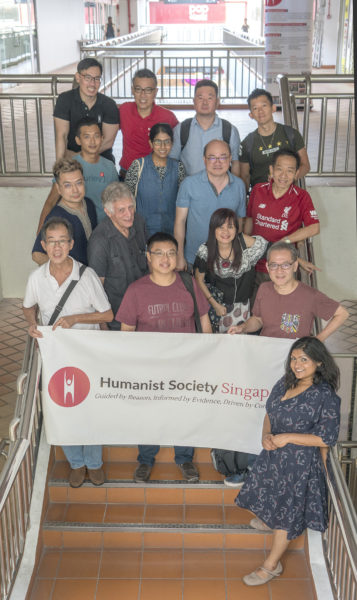Dr Tim Bunn’s presentation of “Can Neuroscience solve the problem of Consciousness”, kicked off the HSS Psychology Talk fortnightly series yesterday.
It was difficult and arduous at first, for a mind to contemplate understanding the mind itself, and Tim did not make it easier, by saying he could only attempt to correctly summarise the thinkings of the other philosophers and neuroscientists.
From Descartes , to Chalmers, Dan Dennett, Dehaene, Graziano, Tononi, Greenfield and eventually Damasio, Tim brought to the table his understanding of and confusions with models proposed by these great minds.
Questions were taken every step of the way, and it was clear to see they were questions seeking some kind of ‘exact-science’, and clean-cut certainty answers. The answers from Tim, however, were never overtly definitive, and we later found out why.

Tim’s valiant attempt to present the work of more than 7 philosophers/neuroscientists within 3 hours left us breathlessly trying to digest a dazzling variety of metaphors, models and conclusions. He took us onto the next one, and the next, and the next. The relentless effort to continue to plough the hard field, to some may seem tiring and pointless, but after a few of these transitions, it was inevitable that the human brains in the room found a pattern : all philosophers and neuroscientists are trying to define the mechanism and define in their own words what consciousness is.
Tim’s conclusion at the very end, using Dehaene’s flipping of Chalmers’ postulation of hard and easy questions, was brilliant, with a deja vu of how psychology experiments are sometimes conducted : tell the participant something different, to throw them off what the experiment was really trying to find out.
If hard things are easy to accomplish, they won’t be challenging nor fulfilling things anymore. By teaching our own brain to analyze our own mind, this isn’t a simple task – in fact more difficult than any person grudgingly admitting his/her strong opinions may be wrong.
Deceptions/illusions and differences are really two very big characteristics of human learning and understanding. They are in our nature, but the descriptors used, to cause us to be ‘self-aware’ , are still very fluid and intangible. We should continue to explore these, while using humanistic ideals of directing our paths in search of certainty, to lead our shared lives, and understand that certitude can be an attitude that can sometimes stifle curiosity & learnings.
It was well worth the $10/$15 alone for the ‘book reviews’ Tim gave, of books written by the scientists and philosophers; and the journey Tim took us on was one that was well-guided, and not a spoon-fed one. If we truly are conscious only a small fraction of our activities and unconscious the rest, I’d say it was well worth the money for the conscious mind being challenged. And the avalanche of thinking it triggered off – priceless.

Some stayed for photos.
The next talk, “Agent-based Modelling & Game Theory”, by Dr Ronald Ng, is on 13 October 2018 (Saturday), 2-5pm.




